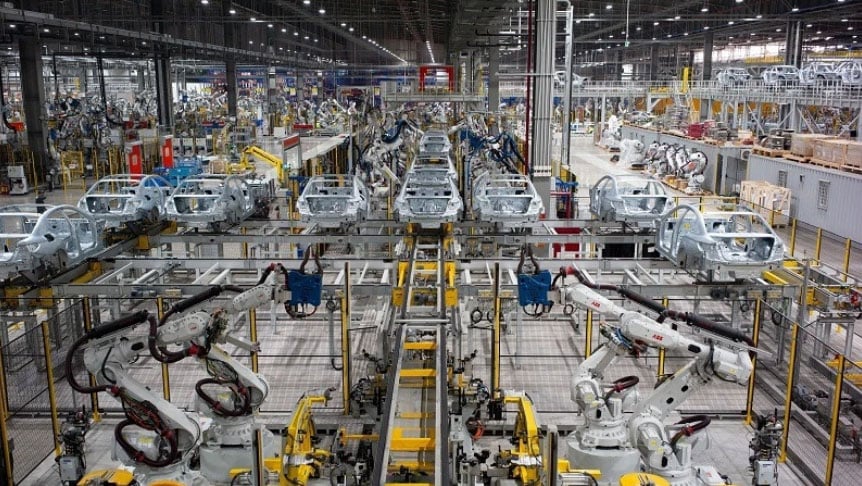However, the path to private economic development still faces many barriers - especially institutional and legal barriers. Meanwhile, the law - if properly developed and effectively enforced - will become a solid "support" to help the private economy develop sustainably, contributing positively to the country's modernization. In the context of Vietnam's strong transformation towards a modern, deeply integrated market economy, the question is: Has the law truly become a driving force for the private economy? And what are the gaps that need to be filled so that the legal institution can truly accompany private enterprises?...
Rich in potential, but also many difficulties
The private sector in Vietnam has made remarkable progress and left a strong mark on the overall picture of the national economy. With its creative spirit, daring to think and act, and ability to quickly adapt to market conditions, this sector has been playing a key role in promoting growth, creating jobs, and shifting the economic structure towards industrialization and modernization.
In 2024, the country will have more than 157,200 newly registered enterprises with a total registered capital of more than VND 1,547,000 billion. This is a record number, reflecting the dynamism and strong vitality of the private economic sector. In addition, the private enterprise sector contributes more than 65% of GDP, demonstrating the important role of this sector in the national economy. With such positive contributions, the private economy is affirming its key position in promoting growth, creating jobs and shifting the economic structure towards industrialization and modernization.
Another noteworthy point is the role of the private sector in expanding markets and strengthening international connectivity. Many private enterprises have not only focused on the domestic market but have also expanded to regional and global markets. Actively participating in free trade agreements, improving competitiveness, and innovating business models have helped the private sector gain better access to global value chains, while contributing to enhancing the image of Vietnamese enterprises in the international market.
In addition, the private sector also contributes significantly to innovating production methods, promoting technology and innovation. Many startups are born with breakthrough technological solutions, solving practical problems in society. By 2024, Vietnam will have more than 4,000 innovative startups, including 2 "unicorns" and 11 businesses valued at more than 100 million USD. This is a positive signal demonstrating the great potential and potential of this sector if supported and developed in the right direction.
Despite its impressive achievements, the private sector in Vietnam is still facing many difficulties, both internal and external. These obstacles not only hinder the development of enterprises, but also create a large gap between the potential and actual contribution of this sector to the national economy.
While state-owned enterprises often have advantages in accessing land, credit and support mechanisms, most private enterprises - especially small and medium-sized enterprises - struggle with cumbersome administrative procedures and the “ask-give” mechanism that still exists. Access to bank capital is still difficult due to lack of collateral, weak credit records and credit assessment processes that are not suitable for the flexible business operations of the private economic sector. The situation of facing unfair competition also creates insecurity and lack of motivation for long-term investment for many domestic entrepreneurs.
In addition, the legal system, although in the process of being completed, is still inconsistent, many regulations are unclear, leading to arbitrary interpretation by different levels of government. This creates great legal risks for businesses during their operations. Not to mention, most private enterprises, especially small and medium enterprises, are still weak in management capacity, business strategy, as well as the ability to apply technology in production and operation. Lacking a high-quality workforce, and having little ability to connect and participate in the global value chain, many businesses are still operating according to traditional, fragmented and unprofessional models.
Legal support in private economic development
Law plays a very important role in shaping and developing the economy, especially the private economy. In the context of Vietnam's economy changing strongly, building and perfecting the legal system not only helps create a stable business environment but also promotes the sustainable development of the private economic sector. For the private sector, having a transparent and stable legal system is a prerequisite for businesses to feel secure in investing, expanding production and developing sustainably.
Laws such as the Enterprise Law, Investment Law, Intellectual Property Law, and sub-law documents related to administrative procedures, taxes, and consumer rights protection must be implemented fairly and clearly. This not only protects the legitimate rights of enterprises but also helps prevent abuse of power by authorities. Private enterprises, especially small and medium-sized enterprises, often have difficulty protecting their rights due to lack of experience and resources.
Meanwhile, the law provides necessary tools such as the right to sue, dispute resolution and intellectual property protection, thereby helping businesses ensure safety in business operations. Protecting these rights will create confidence for investors and encourage them to participate in the market. Private enterprises need a level playing field where they can compete with other businesses without worrying about unfair preferences from state agencies or state-owned enterprises. The law will help ensure that private enterprises are not treated unfairly and have the right to compete on the basis of capacity and innovation. This not only creates a healthy competitive market but also encourages businesses to improve the quality of products, services and develop sustainably.
In the context of the digital economy and Industry 4.0, the law also plays an important role in promoting innovation and digital transformation in the private sector. Legal regulations related to the protection of intellectual property rights, encouraging investment in research and development, along with policies to support businesses in digital transformation are very important. These legal mechanisms not only help private enterprises maintain their competitive advantage but also create opportunities for businesses to catch up with the trend of the digital economy, thereby contributing to the overall development of the national economy.
The world is witnessing the rapid growth of new forms of business such as online business, sharing economy, and startups. These forms require flexible changes in the legal system to adapt and facilitate the development of these businesses. The law needs to provide appropriate mechanisms to promote innovation, protect consumer rights in the new business environment, and at the same time protect fairness and transparency in commercial transactions.
Law is not only a tool to regulate economic activities but also an important factor in building trust and motivation for the sustainable development of the private economy. Therefore, a strong, transparent and fair legal system is an indispensable factor in promoting the development of the private economic sector, contributing to improving competitiveness and contributing to the overall development of the Vietnamese economy.
Perfecting the legal system and institutional reform
Completing the legal system and institutional reform are important factors to help the private sector develop more strongly, especially in the current context of integration and digital transformation. Laws need to be adjusted, supplemented and regulations clarified to create a favorable, transparent, fair business environment and encourage private enterprises to develop sustainably.
Strengthening law enforcement and administrative transparency is one of the decisive factors in creating a fair and stable business environment for the private sector. Although Vietnam has made many legal reforms in recent years, law enforcement is sometimes inadequate and lacks transparency. This makes it difficult for businesses to comply with regulations, and creates a situation of “power of relationships” affecting fair competition in the market.
For the private sector to develop sustainably and continuously grow, a transparent and effective dialogue mechanism between the State and private enterprises is necessary.
Therefore, it is necessary to build and maintain dialogue forums between the State and private enterprises, especially small and medium enterprises. The State also needs to listen to and absorb feedback from enterprises to adjust economic development policies to better suit reality. This not only helps improve the business environment but also helps private enterprises to promptly respond to changes in policies and laws.
Dialogue mechanisms need to be truly open, public and transparent, thereby enhancing businesses’ trust in the State. This mechanism will help private businesses receive timely support from state management agencies and create a platform for working together to find solutions to common difficulties.
The private sector plays an important role in the sustainable development of the Vietnamese economy. Not only does it contribute to promoting growth, creating jobs and improving people's lives, the private sector is also the main driving force in transforming the economic model and enhancing national competitiveness. However, for the private sector to develop strongly and sustainably, a strong, transparent and fair legal system is a prerequisite. The law not only protects the interests of businesses but also creates a stable and fair business environment, encouraging innovation and investment.
To develop the potential of the private sector, there needs to be close cooperation and companionship between the State, enterprises and the whole society. The Government needs to continue to reform and perfect policies and laws, while improving administrative procedures and minimizing legal risks. Private enterprises need to be proactive in innovation, improve competitiveness and comply with legal regulations. Along with that, the whole society needs to deeply understand the role of the private economy in building a prosperous, fair and sustainable economy. Only with this close coordination can we build an effective institution, support the development of the private economy and create a solid foundation for the future development of the country.
Source: https://baoninhthuan.com.vn/news/152975p1c25/phat-trien-kinh-te-tu-nhan-va-vai-tro-cua-phap-luat-trong-the-che-viet-nam.htm






![[Photo] Ready for the top competitions of Vietnamese table tennis](https://vphoto.vietnam.vn/thumb/1200x675/vietnam/resource/IMAGE/2025/5/18/9c547c497c5a4ade8f98c8e7d44f5a41)

![[Photo] Many young people patiently lined up under the hot sun to receive a special supplement from Nhan Dan Newspaper.](https://vphoto.vietnam.vn/thumb/1200x675/vietnam/resource/IMAGE/2025/5/18/6f19d322f9364f0ebb6fbfe9377842d3)
![[Photo] Party and State leaders attend the special art program "You are Ho Chi Minh"](https://vphoto.vietnam.vn/thumb/1200x675/vietnam/resource/IMAGE/2025/5/18/6895913f94fd4c51aa4564ab14c3f250)

















































































Comment (0)